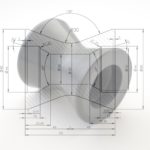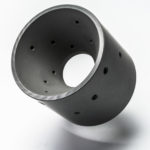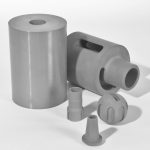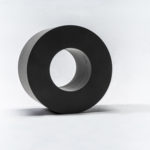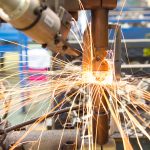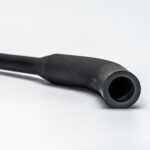Drawing metal wire through dies generates intense friction as coating and extruding cable exposes tools to high heat. These tough conditions challenge wire and cable manufacturers, who must optimise for efficiency without sacrificing equipment durability. Sialons, a specialized class of technical ceramics derived from silicon nitride, provide a solution. Their remarkable resistance to wear, heat, and corrosion helps extend tool life, boosting performance and reducing downtime across production lines.
Author Archives:
Top 10 Applications of Zirconia Ceramic in Modern Industries
Zirconium dioxide (ZrO2), or zirconia, has a rich history of diverse applications. This is courtesy of the material’s many strengths, including its aesthetic qualities. Gemstones derived from zircon were prized in ancient Egyptian jewellery, and though the material generally finds more practical applications today, cubic zirconia remains the most popular diamond simulant on the market. At the other end of the spectrum—as far as functionality is concerned—zirconium alloy tubing is ubiquitous in nuclear power stations, as it boasts extremely low neutron capture. In fact, more than 90% of mined zirconium is deployed in fission reactors.
And, still, there are many more applications of zirconia ceramics to explore.
Manufacturing Process of Ceramic Products: A Guide for Materials Engineers
Engineers increasingly turn to technical ceramics for demanding applications where traditional materials fall short. These materials offer an outstanding combination of high hardness, superior wear resistance, and robust thermal stability, maintaining their integrity under extreme temperatures and corrosive environments. Whether for aerospace components, cutting tools, or molten metal components, their unique properties make them indispensable. Their low mass compared to metals further enhances performance by providing strength without excessive weight, making them an ideal choice for advanced engineering solutions.
How to Prototype and Test Ceramic Solutions for Abrasive Conditions
Prototyping is inherently concerned with meticulous material selection. It concerns the rigorous, multi-step process of generating the right tool for a job. This can be complex even for relatively forgiving conditions. But there is very little margin for error in wear applications. Poor material selection can have severe deleterious effects on operations with abrasive environments. It’s essential to choose materials that can withstand the dynamic stresses of the intended application. However, there is no one-size-fits-all solution in the world of prototyping.
Continue readingIs Brittleness an Issue for Ceramic Parts in Flow Systems?
Pipes, valves, and other flow components must withstand significant thermomechanical stresses, plus chemical exposure throughout service. But these factors are far from constant. Sharp temperature variations can induce brittleness. Abrupt mechanical stress can allow microcracks to propagate. Over time, these issues can precipitate microstructural changes that increase a material’s tendency to break under stress.
Continue readingSilicon Carbide Vs Tungsten Carbide in Wear Applications
How do you decide between one engineering material and another? Cost is often one of the main influencers, but it is impossible to fully characterise integration and maintenance costs without fully understanding the material’s time-dependent performance under service conditions. Continue reading
Which Engineering Materials to Choose When Stainless Steel Fails
Stainless steel is an extremely popular engineering material, but it is not without flaws. The characteristic corrosion resistance of stainless grades will diminish under certain challenging conditions. Corrosion, erosion, and oxidation are not only possible but likely in the presence of harsh chemicals, extreme temperatures, and abrasive media. These factors contribute to performance and structural losses over time. Fortunately, there is a wealth of alternatives to choose from. Continue reading
Advanced Ceramics and Wear Prevention
The properties of advanced ceramics make them extremely valuable in a wide range of industrial applications, like transportation, aerospace, and manufacturing. Most advanced ceramics are imbued with a crystalline or semi-crystalline structure, meaning they have improved thermal, electrical, and mechanical attributes. Moreover, advanced ceramics are specifically designed with a microstructural composition that is consistent to maintain the ceramic’s enhanced characteristics.
Continue readingUnderstanding the Hidden Costs of Milling Media
Milling media is a critical component in the materials processing industry. It plays a pivotal role in the mechanical reduction of particle size in a vast array of raw materials and products, from pharmaceuticals to ceramics and metals.
Continue readingShot Blast Nozzle Shape, Size, or Material: Which Matters Most?
In the specialized field of surface treatment, shot blasting emerges as a key technique. At the heart of its success is the shot blast nozzle. This is a component that has a design that can significantly influence the final results of your treatment.
Continue reading


